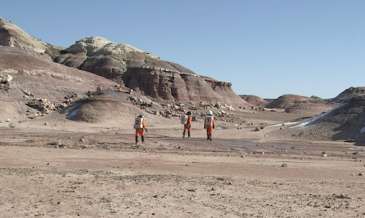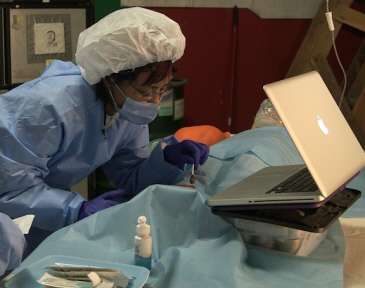Mission accomplished for Mars expedition

Ashley Dale, a PhD student in Aerospace engineering, led a team of seven experts on the two week mission to the Mars Desert Research Station [MDRS] in Utah.
The team included two fellow PhD students from the University - Michaela Musilova, an expert in astrobiology and geomicrobiolgy, and Sue Ann Seah, who works in haptic and spacesuit design engineering.
The aims of the expedition were to conduct research that would help prepare for future missions and to publicise the importance of space travel to Mars.
The team conducted a range of experiments, including successfully field-testing hardware developed at NASA that extracts hydrogen and oxygen from soil. This technology could potential use naturally occurring resources on Mars to generate breathable air, drinkable water and rocket fuel for return to Earth. This will dramatically reduce the weight and cost of future space missions.
Terraforming Mars was also explored, which is the process of adapting the environment of other planets to mimic that of Earth. Micro-organisms that have already been weather-tested in Arctic conditions in Greenland and Svalbard were placed in the harsh and nutrient-poor desert soils, which are very similar to that of Mars, to see how they survived.
Team members carried out a number of simulated surgeries using tele-surgery, linking with the Concordia Base in Antarctica and several other groups around the world to carry out surgical procedures under expert guidance, including mending a broken leg.
Astronauts who travel to Mars in the future will not necessarily be experts in every medical field. This study investigated how medics can be supported to carry out unfamiliar procedures using tele-links and looked at issues of restricted and delayed communications in emergency situations.
MarsCrew134 - Ashley Dale from Kai Staats on Vimeo.
The team spent two weeks in the high altitude, barren Utah dessert, where they lived in cramped conditions with limited amounts of electricity, water and oxygen. To ensure the expedition was as realistic as possible they also lived off dehydrated, powder-like food.

Speaking after his return from MDRS, Ashley said: "Overall the mission has been a success. As space agencies around the world slowly come together on the grand challenge of sending a manned mission to Mars, this sort of research is vital.
"I have no doubt that bringing the UK onto the stage will bring many economic and social benefits for the nation further down the line."
Provided by University of Bristol


















